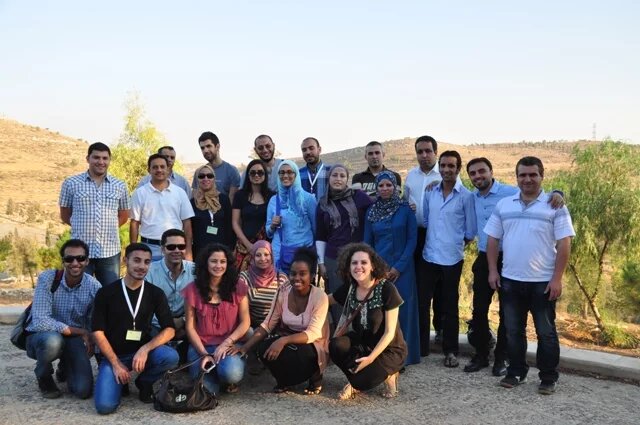
This year’s Summer School brought together 21 young professionals aged 21 to 34 years from Morocco, Tunisia, Egypt, Lebanon, Iraq, Palestine, Jordan, and the U.A.E. Their diverse backgrounds varying from journalism and research to activism and private sector, in addition to their different regional perspectives, provided the framework for long and passionate discussions about the topics discussed in two main modules:
Module I drew the participants’ attention to the close relation between climate change and gender, and contextualised this linkage within the limitations and risks women face in the Arab MENA region. To this end, renowned environmentalist and lecturer Irene Dankelman introduced the participants to the concept of gender, and highlighted the many ways in which gender aspects play a role with regards to adaptation and risk disaster management. She emphasised that the term gender addresses not only the position of women in society, but tries to analyse the relationship between women and men in different areas in a society. It is therefore important to analyse the different structures of vulnerability from a gender perspective in order to not perpetuate them. Climate finance actors and institutions play an important role in shaping adaptation and mitigation strategies on the local and regional level, but their work needs to be critically examined in terms of gender-sensitivity as Liane Schalatek, associate director of hbs Washington, pointed out in her presentation. An important step is being taken through a study by hbs and GenderAction which is analysing the gender-responsiveness of climate-relevant multilateral investments with an adaptation focus in the MENA region. She shared the draft study with the participants, while the final study shall be available for the UN Climate Change Conference in Doha (COP18) at the end of the year. Fidaa Haddad, gender focal point at IUCN West Asia, and Kulthoum Omari of hbs Cape Town explained how explicitly and consistently integrated gender considerations in adaptation planning and management can offer an opportunity for developing effective adaptation and build resilience. While Fidaa provided regional case examples from her work with IUCN, Kulthoum shared her experience of the work in southern Africa. She presented the results of a study that was conducted in Botswana, South Africa, Namibia, and Mozambique on gender-differentiated impacts of adaptation projects. Adaptation strategies and approaches will not be effective without addressing the existing inequality and equity. To conclude the module’s input, Nisreen Mazzawi, lecturer and researcher with focus on gender, environment, and human rights, as well as founding member of the Palestinian Feminist Forum, gave a lecture on the concept of gender and the implications of gender inequality for environmental politics. She emphasised that by perceiving the concept of “gender” as synonymous with “women”, the focus remains on women as objects of policies. Rather than putting gender on the agenda (as it is already there), it is necessary to enhance the ability to perceive and understand social interactions and institutionalised practices in which gender is deeply embedded, and which frae, permit, inhibit, distort or prevent processes of agenda-setting.
To break up the density of the theoretical input, the participants were given the chance to participate in a workshop on the opportunities of social media for communicating environmental issues. In two highly interactive sessions, Ramsey George and Reem Al Masri from hbs’ partner 7iber.com shared their experience with regards to visualisation and distribution of information.
Module II of the Summer School elaborated on the risks and impacts of climate change in the urban context. Rania El Masri, environment and policy officer at the UNDP Regional Centre in Cairo, familiarised the participants with the severe challenges that climate change poses for urban areas with regards to water. To this end she provided an overview over the current status of water resources in the MENA region, and drew the connection to population growth and urbanisation rates in the region. Decreasing water supplies in combination with constantly increasing demand pose a severe threat to livelihoods all over the region, specifically in the urban context. An important aspect to take into account is the political economy of water. Yaser Abu Nasr of the American University of Beirut focused on the spatial dimension of adaptation planning in the MENA region. He concludes that adaptation, especially in the urban context, requires multidisciplinary and flexible approaches. Adaptation measures can be differentiated into no-regret measures (which will deliver benefits that exceed their costs whatever the extent of climate change), low-regrets measures (which are low cost, but can potentially have large benefits under climate change), and win-win measures (which can contribute to climate adaptation and also deliver other benefits). Both lecturers highlighted the regional particularities through the introduction of case studies of cities in the Arab Middle East and North Africa. Following the theoretical input, the summer school participants were taken on a field trip to two adaptation sites of the municipality of Amman, which focused on grey water usage and desertification.
Finally, Karim Makdisi of the American University of Beirut, and Wael Hmaidan, founder of IndyACT and member of the Climate Action Network (CAN) discussed the challenges for climate change policies and civil society activism regarding the Arab Spring. While opportunities have opened up with the democratic revolutions and some countries have already developed a more progressive approach, the bulk of the Arab League Countries is still at the forefront of the oil and gas-based, carbon intensive economies.
With the end of the Climate Change Summer School another network was formed to continue working on the discussed topics. The commitment and contribution of the participants was a reminder of the regional capacities and potentials to push this debate forward.
You can find more pictures of the Summer School on Facebook. To receive regular updates on our work and the work of our partners, please follow our Facebook page.
//-->